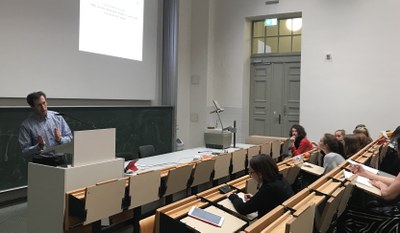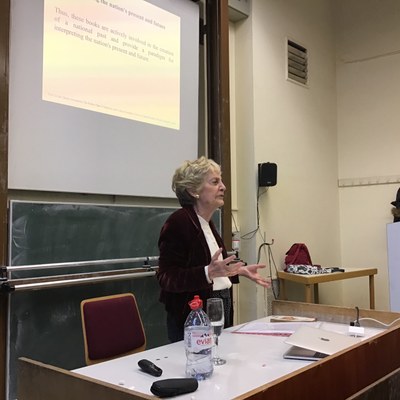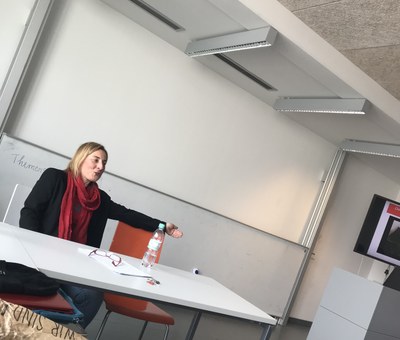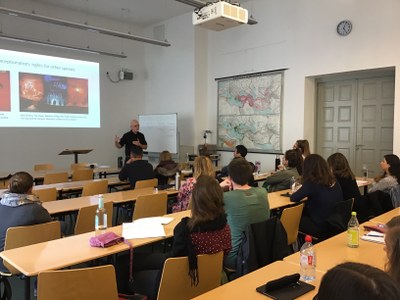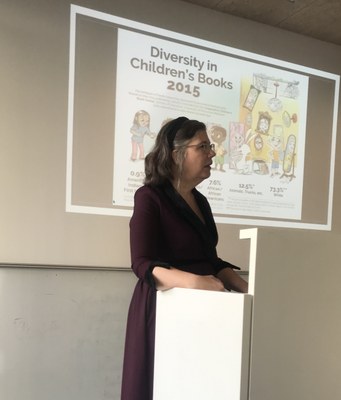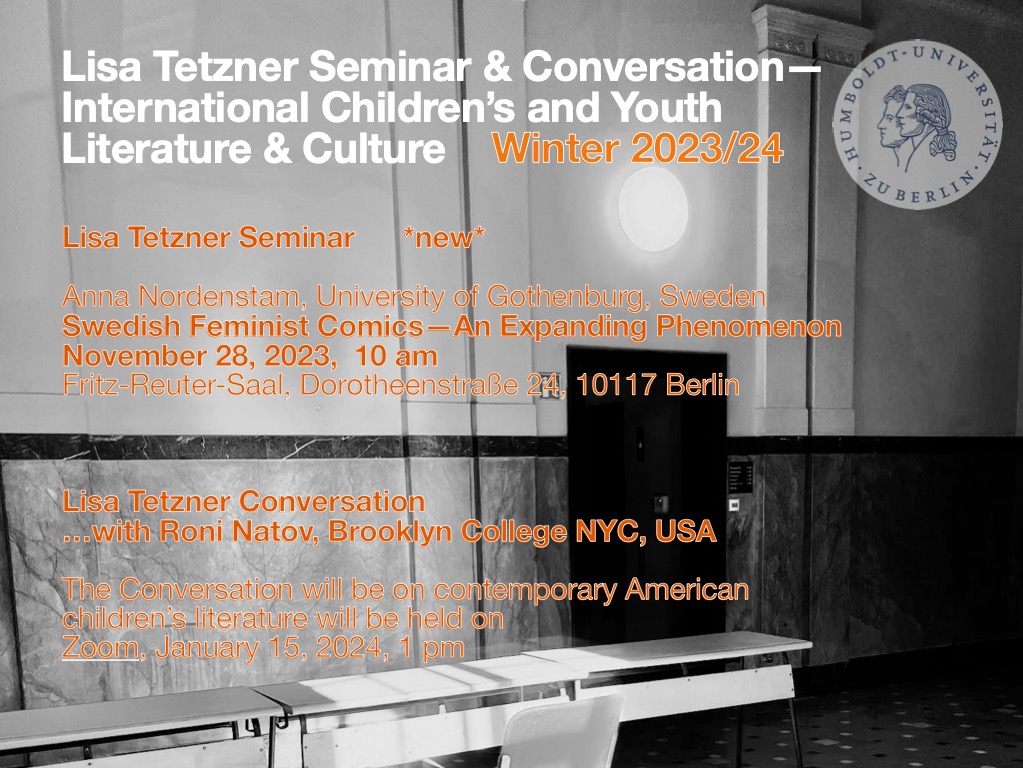Lisa Tetzner Lectures at Humboldt-Universität zu Berlin
The Lisa Tetzner Lectures were founded in 2018. The lectures focus on literature & culture for children and young people as well as connected fields, concentrating on the significance and relevance of children's and young people's literature within a broader international cultural landscape. International scholars in the field are invited to Humboldt-Universität zu Berlin for academic talks and discussions with students and faculty about significant research and new developments in the field (in English or German). The Lisa Tetzner Lectures are named after the important German children’s author, who was famous for her large œuvre of exile literature for children, written during her own exile from Nazi Germany in Switzerland. Lisa Tetzner's major contribution in politically motivated literature for youth was a series of nine novels, known as "The Children of No. 67" (Die Kinder aus Nr. 67). The books follow a number of child characters from a Berlin working class background from the end of the Weimar Republic to the end of the war, depicting their different fades as children under the Nazis, e.g. as child refugees, as war participants, and finally as an international post-war generation who engages in question of a peaceful world after the Holocaust.The literary genres and subjects embedded into Tetzner’s work connect deeply with political matters, such as fight against fascist ideology, war and refugee experiences, resistance and social responsibility, and many appearing in the series ring still relevant today.
Lisa Tetzner Lectures —
Talks on International Children’s and Youth Literature & Culture
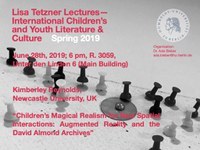
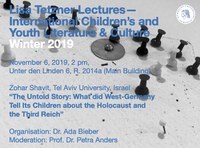
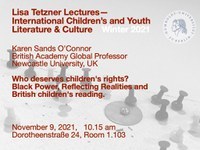
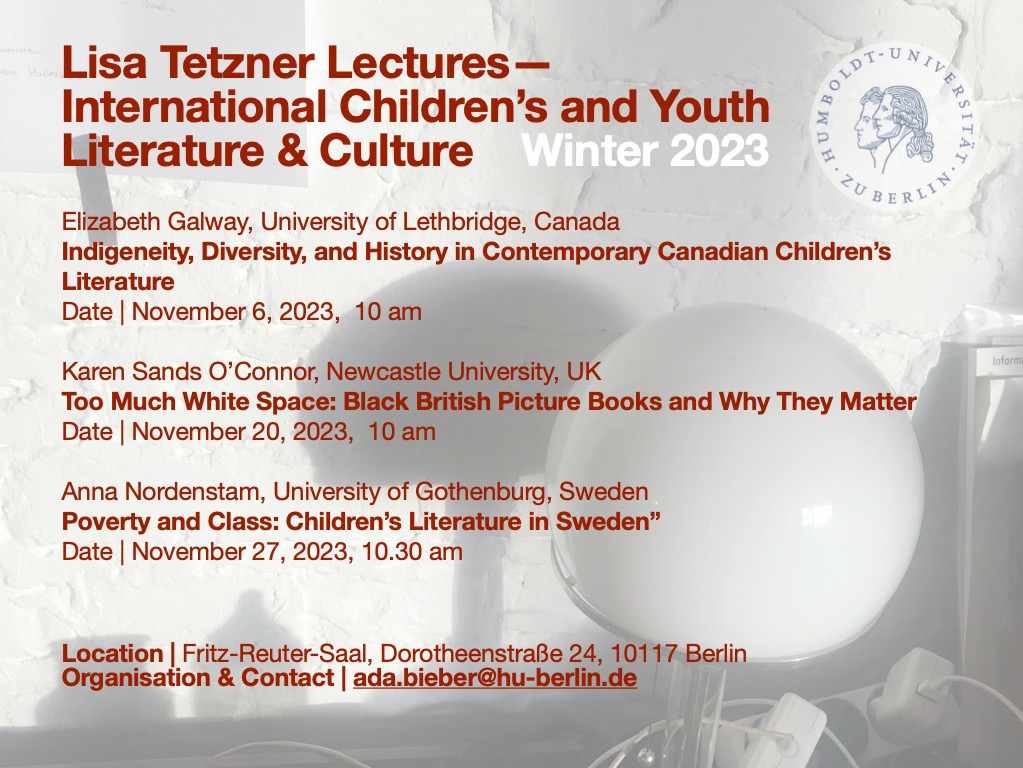
Contact:
Dr. Ada Bieber,
Institut für deutsche Literatur,
ada.bieber@hu-berlin.de
The Lisa Tetzner Lectures were founded in 2018. The lectures focus on literature & culture for children and young people within an international context. The lectures concentrate on the significance, relevance and influences of children's and young people's literature within a broader international cultural landscape. International scholars in the field are invited to Humboldt-Universität zu Berlin for fruitful academic talks and discussions with students and faculty about significant research and new developments in the field (in English or German).
In so doing, the Lisa Tetzner Lectures foster #Internationalisation@Home both in teaching and in research, and initiate academic dialogues across cultures, disciplines and different academic systems. Since 2023, the Lisa Tetzner Lectures have broadened into Lisa Tetzner Lectures, Lisa Tetzner Seminars and Lisa Tetzner Conversations in order to enrich academic dialogue with students and faculty at Humboldt-Universität zu Berlin as well as with the larger community.
____________
Die Lisa Tetzner Lectures wurden 2018 gegründet und stellen internationale Kinder- und Jugendliteratur sowie kulturelle Angebote für junge Menschen in den Fokus. Die Lectures konzentrieren sich insbesondere auf Bedeutung, Relevanz und sowie Einfluss von diversen Kinder- und Jugendliteraturen/-kulturen auf größere kulturelle Landschaften im globalen Kontext. Zu den Lectures werden internationale Wissenschaftler:innen aus der Kinder- und Jugendliteraturforschung zu akademischen Vorträgen und Diskussionen zu zentralen Forschungsthemen und neunen Entwicklungen in der internationalen Kinder- und Jugendliteratur eingeladen, um einen aktiven Austausch mit Studierenden und Kolleg:innen an der HU zu ermöglichen (in Englisch oder Deutsch). Die Lectures sind einem internationalen Wissenschaftsaustausch verpflichtet und tragen zudem zu einer #Internationalisierung@Home in Forschung und Lehre bei. Sie wenden sich sich im besonderen Maße gesellschaftlich relevanten Fragestellungen und aktuellen Forschungsftendenzen zu und schlagen interdisziplinäre Brücken in andere Fächer und Disziplinen.
Seit 2023 wurden die Lisa Tetzner Lectures um neue Formate akademischen Austausches erweitert, so dass die Lisa Tetzner Lectures nun neben Lisa Tetzner Seminars und Lisa Tetzner Conversations stehen. Dadurch werden wissenschaftliche Diskussion über Literauren und Kulturen junger Menschen noch vielgestaltiger und lebendiger zwischen Wissenschaftler:innen aus aller Welt und Studierenden, Kolleg:innen der Humboldt-Universität zu Berlin sowie interessierten Gästen aus der Öffentlichkeit geführt.
Lisa Tetzner Lectures 2025
Upcoming THIS WEEK
Lisa Tetzner Conversation with Prof. Dr. Roni Natov, Brooklyn College, USA
"New York & Diversity in Picturebooks: Open Conversation"
Monday, November 10, 2025
1.30 pm Berlin time:
TUNE IN:
Join Zoom Meeting
https://hu-berlin.zoom-x.de/j/66620933772?pwd=uu6apednqUY8wMw2BpJFLIG6oUMbSQ.1
Meeting ID: 666 2093 3772
Password: 164537
Lisa Tetzner Talk & Conversation with Prof. Dr. Daniel Feldman, Bar-Ilan University, Israel
"Reclaiming Korczak: From Holocaust Hero to Children's Rights Visionary"
November 11, 2025, 2 pm
Dorotheenstraße 24, Fritz Reuter Saal (Dritter Stock, Zentraler Treppenaufgang)
Prof. Dr. Daniel Feldman is Senior Lecturer of English Literature at Bar-Ilan University, Israel, where he focuses on Holocaust literature and children’s literature. His book Poesis in Extremis, co-written with Efraim Sicher (Bloomsbury Academic, 2024), addresses poetry written by Jews under Nazi persecution during the Holocaust. His scholarship children’s literature in Hebrew, German, English, and Polish has appeared in Children’s Literature in Education, Lion and the Unicorn, and Bookbird.
_____________________________
Past Lisa Tetzner Seminars & Conversations:
*Lisa Tetzner Conversation*
Chantal-Fleur Sandjon, Berlin
Lisa Tetzner Converation with Chantal-Fleur Sandjon
(April 29, 2024), Moderation: Ada Bieber
Roni Natov, Brooklyn College NYC, USA
Lisa Tetzner Conversation with Roni Natov
(January 15, 2023), Moderation: Ada Bieber
*Lisa Tetzner Lectures*
Bettina Kümmerling-Meibauer, Germany
Das große Krabbeln: Die Darstellung von Insekten im Bilderbuch
(October 28, 2025)
Larissa Rudova, Pomona College, USA
No Longer Erased: Diverse Characters in Post-Soviet Eastern European Children’s Literature
(June 16, 2025)
Larissa Rudova, Pomona College, USA
Out of the Closet: Russian YA Writers Exploring Gender Issues
(November 4, 2024)
Philip Nel, Kansas State University,USA
Decolonize Your Imagination: Read Diverse Children’s Books
(July 8, 2024)
Sonja E. Klocke, University of Wisconsin–Madison, USA
Entwicklungsinseln in der Stadt und auf dem Land: Benno Pludras Insel der Schwäne (1980) und Hermann Zschoches Verfilmung (1983)
(June 18, 2024)
Lena Hoffmann, Universität Bielefeld, Germany
Authorship in the field of children's and young adult literature: Enid Blyton as a case study (June 10, 2024)
Nina Christensen, Aarhus University, Denmark
Where Colonialism, Romanticism and Modernity meet: Children’s literature on childhood in Greenland around 1950 and beyond
(May 27, 2024)
Johari I. Murray, Universidad Nacional de Educación a Distancia, Madrid, Spain
Diversity Ideologies: Entanglements, Intersections and Teaching of Children’s Literature in the 21st Century
(May 6, 2024)
Anna Nordenstam, University of Gothenburg, Sweden
Poverty and Class: Children's Literature in Sweden
(November 27, 2023)
Karen Sands O'Connor, Newcastle University, UK
Too Much White Space: Black British Picture Books and Why They Matter
(November 20, 2023)
Elizabeth Galway, University of Lethbridge, Canada
Recasting Red Riding Hood, Reimagining Green Gables, and Revisiting the Past in the ‘Great White North’: Indigeneity, Diversity, and History in Contemporary Canadian Children’s Literature
(November 6, 2023, 2023)
Daniel Feldman, Bar-Ilan University, Israel
Time for Reading in Youth Novels about the Warsaw Ghetto
(July 3, 2023)
Larissa Rudova, Pomona College, USA
Landscapes of Trauma: Narratives of Deportation and Evacuation in Soviet Children’s Literature about WWII
(July 4, 2023)
Anna Nordenstam, University of Gothenburg, Sweden
”It could always be worse”. Swedish Feminist Comics and Cartoons
(December 6, 2021)
Karen Sands O’Connor, Newcastle University, UK
Who deserves children's rights? Black Power, Reflecting Realities and British children's reading
(November 9, 2021)
Élodie Malanda, Tilburg University (Netherlands)
Wie die Schwarze Community für mehr Vielfalt in der deutschen Kinder- und Jugendliteratur kämpft
(June 14, 2021)
Zohar Shavit, Tel Aviv University, Israel
The Untold Story: What did West-Germany Tell Its Children about the Holocaust and
the Third Reich
(November 6, 2019) Moderation: Petra Anders
Philip Nel, Kansas State University, USA
How Children’s Picture Books Work: Harold, a Purple Crayon, and the Making of a Children’s Classic
(July 9, 2019)
Kimberley Reynolds, Newcastle University, UK
Children’s Magical Realism for New Spatial Interactions: Augmented Reality and the David Almond Archives
(June 27, 2019)
Richard Gooding, University of British Columbia, Canada
Posthumanism in Writing for the Young: What It Is, What It Does, Where It Needs to Go
(May 28, 2019)
Vanessa Joosen, University of Antwerp, Belgium
Matching Age Studies and Children’s Literature Studies
(April 15 2019), Moderation & Organisation: Julia Benner
Daniel Feldman, Bar-Ilan University, Israel
Reading Games in Auschwitz: Play in Holocaust Children’s Literature
(November 20, 2018)
Sonja E. Klocke, University of Wisconsin at Madison, USA
“Auferstanden aus Ruinen": Berlin Architecture in DEFA Youth Film.
(June 25, 2018)
Julia L. Mickenberg, University of Texas at Austin, USA
Veiled Transcripts: Tracing a Russian Revolution in American Children's Literature, 1927-1945
(Mai 17, 2018)
*Lisa Tetzner Workshop*
Anna Nordenstam, University of Gothenburg, Sweden
Swedish Feminist Comics`-- An Expanding Phenomenon
(November 28, 2023) Moderation: Ada Bieber
Photo Gallery 2024
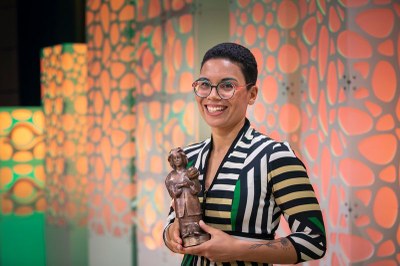
® Sebastian Kissel
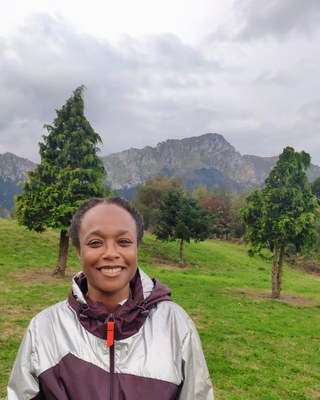
Photo Gallery 2023
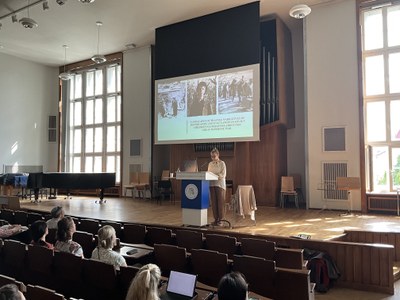
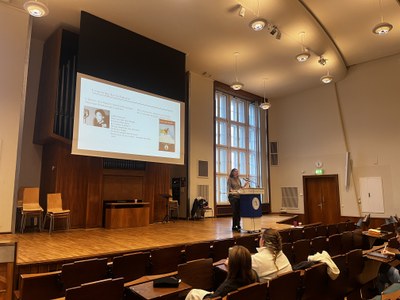
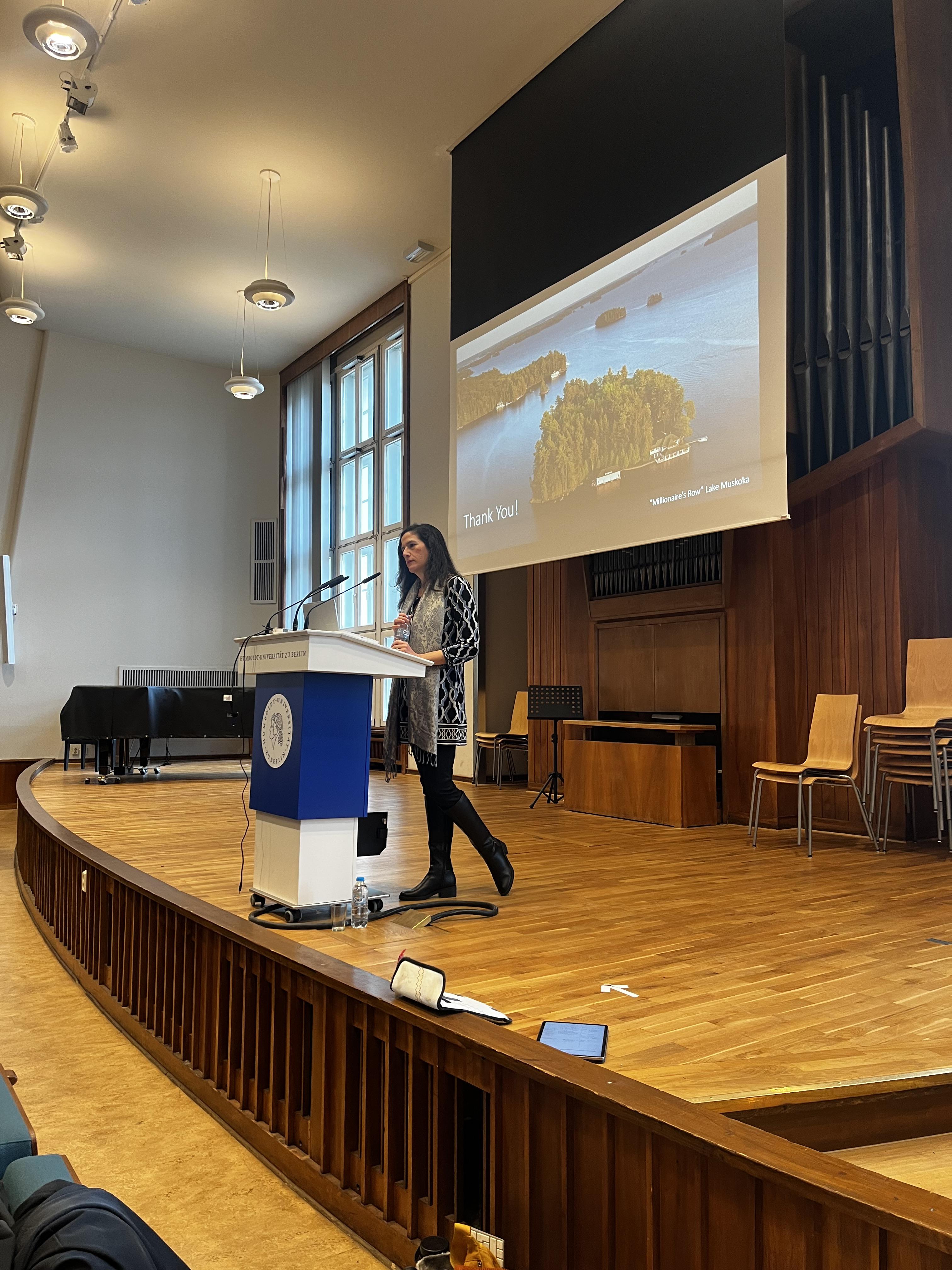
Elizabeth Galway 2023
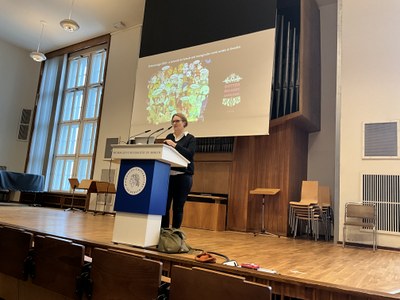
Photo Gallery 2018-2022
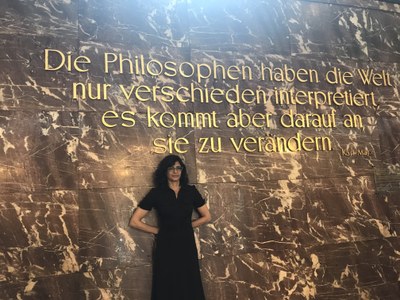
Julia Mickenberg 2018
